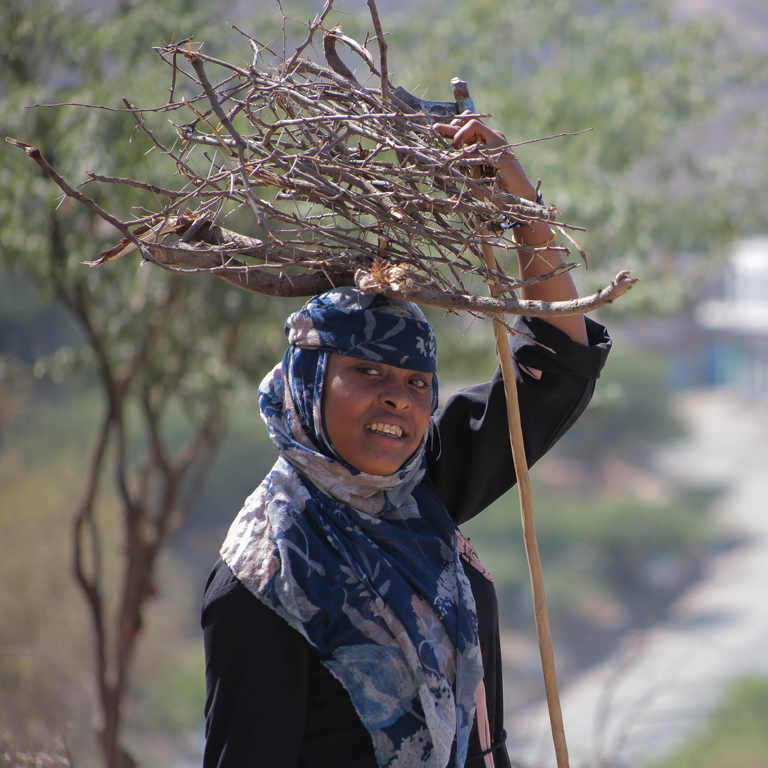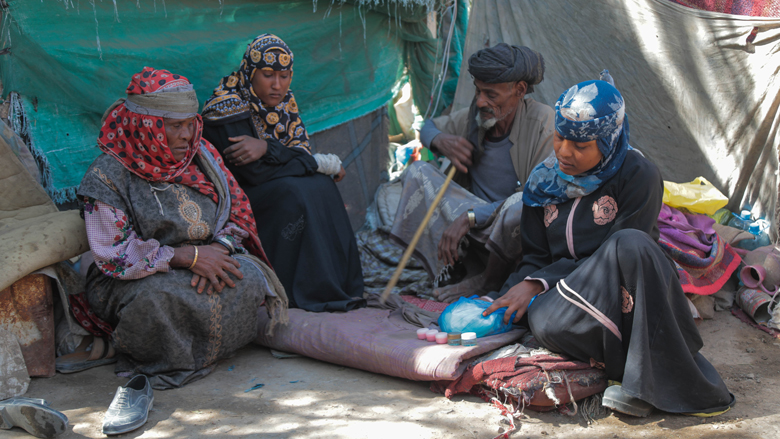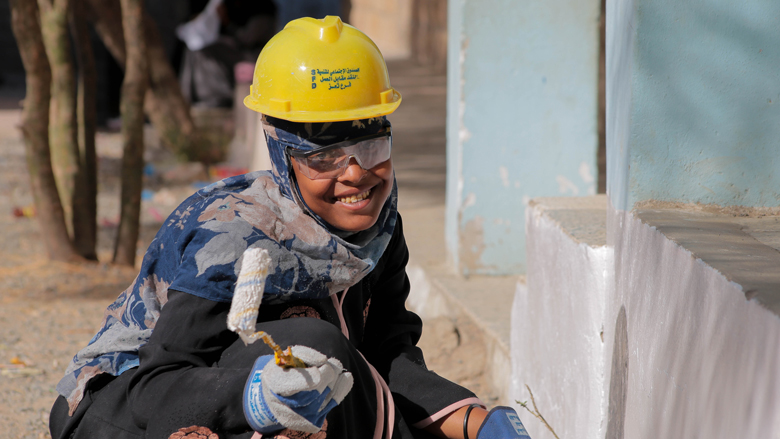Wasila is rebuilding her life after being displaced by fighting in her home area – the Jabal al Habashi mountain region of Taiz governorate in southern Yemen. Finding themselves in the middle of a conflict zone, her family of ten moved through gunfire and landmines to make their way to a displacement camp west of Taiz city. “There were mines on the roads and in our neighbor’s yards. I was so careful not to let any of the children go outside—and taught them how to avoid stepping on mines. We lived through difficult times. There were days where we couldn't find anything to eat. We begged for food,” she says.

Wasila heading home with the firewood so she could make lunch for her family.
Photo: UNDP

Wasila got a training chance from cash-for-work that helps her in gaining money.
Photo: UNDP
Yemen’s six-year-old conflict has left at least 24.1 million people in need of humanitarian assistance, including 12.3 million children and 3.7 million internally displaced persons. Already one of the most food insecure countries in the world, about 70 percent of the country’s population now faces hunger. The conflict decimated the national economy. Gross domestic product has been cut in half since 2015, pushing more than 80 percent of the overall population below the poverty line. Fighting around the country’s seaports, the suspension of commercial imports and ensuing supply shortages, and the depreciation of the Yemeni riyal—now worth barely a third of its 2015 level—have pushed food prices up.
Cash-for-Work Programme
Caught up in this precarious situation, 27-year-old Wasila desperately searched for work with a steady income, so that she would not have to depend on anyone else for assistance or food. “I wanted to earn my money through work,” she said. Representatives from the Social Fund for Development’s (SFD) Cash-for-Work program approached her. This program falls under the World Bank (International Development Association – IDA) funded Emergency Crisis Response Project.

Based on each community’s priorities, Cash-for-Work programs are helping improve incomes, livelihoods, and social mobilization for vulnerable Yemenis. Displaced Yemeni women such as Wasila earn temporary income and learn skills that will help improve their livelihoods. In turn, their host communities benefit from basic service delivery, improved infrastructure, and restored socio-economic assets.
These programs also help the most vulnerable people deal with rising prices by putting money directly into their hands to purchase food, water, medicine, and shelter. While employed, Wasila can afford staple foods such as flour, rice, and oil, as well as sugar and tea. In addition to providing stability and putting food on the table for her children, she is proud she can take care of her parents, and of her elderly grandmother, who is disabled. “If she's hungry I feed her, bring her water, and look after her. I am able to buy her anything she asks for,” she says.
Although she feels safe in her new community and is earning short-term wages, Wasila is eager for the war to end so that she can return to her hometown. “There's no place like my village. I was comfortable there. I did my daily routine and knew how to get food and work. I’m an outsider here; I don't know directions or where to go.”
The World Bank’s Yemen Emergency Crisis Response Project aims to lessen the impact of the crisis in Yemen on local households and communities, and assist their recovery from the bottom up by using local systems, capacities, and institutions to resume service delivery and expand it. To date, nearly 423,000 participants (22.8% of them women) have received paid employment; over 5 million people have accessed key social services; and nearly 700,000 pregnant and lactating women (271,137) and children (403,461) have received nutritional assistance.
Funded and supported by the World Bank’ International Development Association, the Yemen Emergency Crisis Response Project (YECRP) is implemented by the Social Fund for Development (SFD) and the Public Works Project (PWP) in partnership with UNDP. The US$400 million project provides economic stimuli in the form of large cash-for-work projects, support to small businesses and by supporting labor-intensive repairs of socio-economic assets, with the aim of benefiting vulnerable local households and communities across Yemen.

